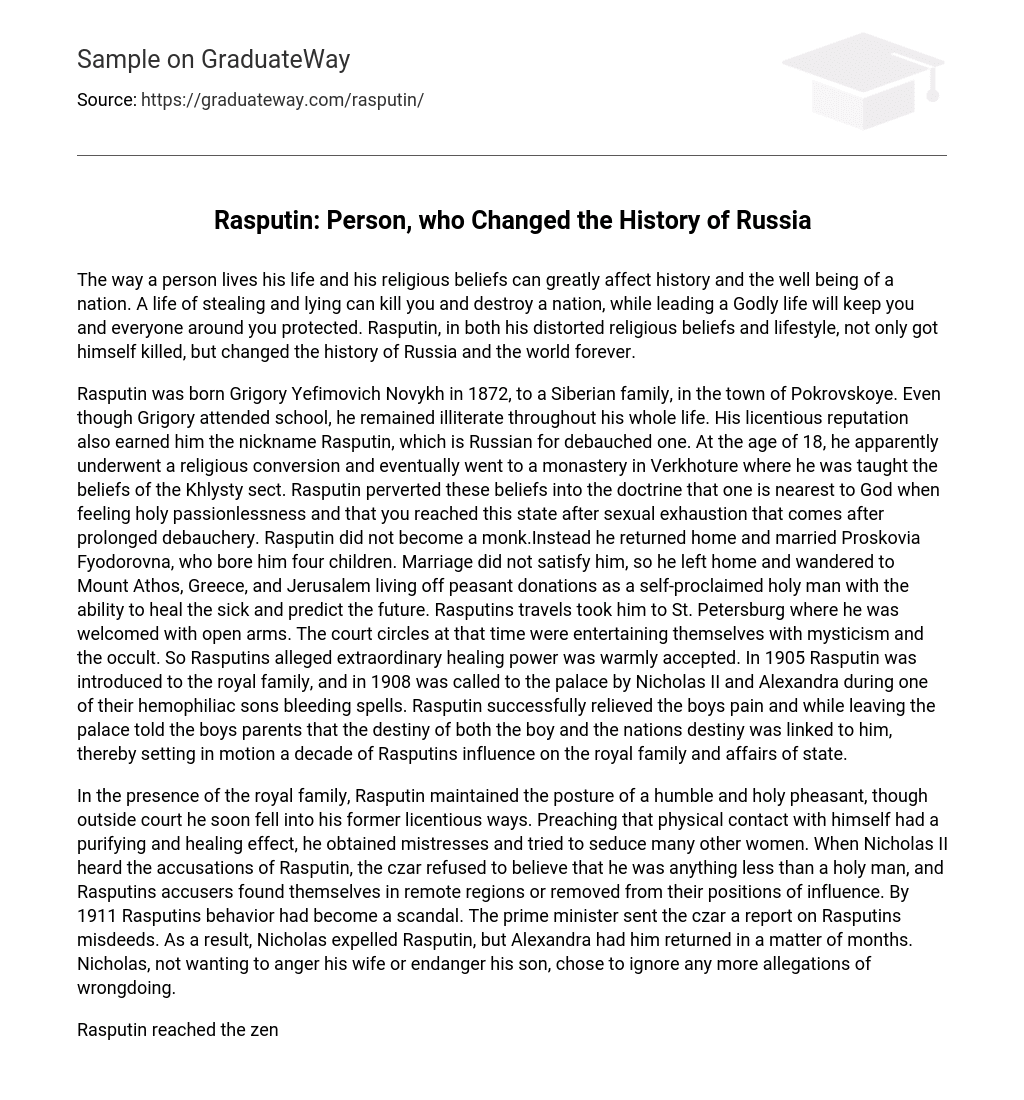The lifestyle and religious beliefs of a person can have a significant impact on history and the prosperity of a nation. Engaging in dishonest and thieving behavior can be detrimental to both oneself and a nation, while adopting a pious way of life ensures protection for oneself and those around them. Rasputin, through his distorted religious beliefs and chosen lifestyle, not only met his own demise but also brought about lasting changes in the history of Russia and the entire world.
Grigory Yefimovich Novykh, who was born in 1872 to a Siberian family in the town of Pokrovskoye, never learned to read or write despite attending school. He acquired the nickname Rasputin, which translates to debauched one in Russian, due to his notorious behavior.
At the age of 18, he joined a monastery in Verkhoture after undergoing a religious transformation. While there, he studied the teachings of the Khlysty sect, but Rasputin distorted these beliefs. He argued that one can be closest to God by being devoid of passion and achieving this state through sexual exhaustion following prolonged debauchery. Instead of becoming a monk, Rasputin returned home and married Proskovia Fyodorovna. They had four children together. Despite his marriage, Rasputin felt unsatisfied and left his family to travel to Mount Athos in Greece and Jerusalem. During this time, he presented himself as a self-proclaimed holy man with healing abilities who could make prophetic predictions while relying on donations from peasants. Eventually, Rasputin arrived in St. Petersburg where he received a warm welcome.
The court circles in that era were engaged in mysticism and the occult, so Rasputin’s alleged extraordinary healing ability was warmly embraced. In 1905, Rasputin was introduced to the royal family, and in 1908, he was summoned to the palace by Nicholas II and Alexandra during one of their hemophiliac son’s bleeding episodes. Rasputin successfully alleviated the boy’s pain and while leaving the palace, he informed the parents that both the boy’s destiny and the nation’s destiny were interconnected with him. This set in motion a decade of Rasputin’s influence on the royal family and state affairs.
In the presence of the royal family, Rasputin portrayed himself as a meek and devoted person, but outside court, he quickly reverted to his immoral behavior. He claimed that contact with him could cleanse and heal, which led him to acquire mistresses and attempt to seduce numerous women. Despite hearing accusations against Rasputin, Nicholas II, the czar, chose to disregard them and viewed him as a saintly individual. As a result, those who accused Rasputin were either banished to distant areas or stripped of their positions of power.
By 1911, Rasputin’s actions had become scandalous, leading the prime minister to send a report to the czar highlighting Rasputin’s wrongdoings. Consequently, Nicholas expelled Rasputin, but within a few months, Alexandra insisted on his return. In order to avoid upsetting his wife or putting his son at risk, Nicholas decided to disregard any further accusations against Rasputin.
Rasputin’s power in the Russian court peaked after 1915. While Nicholas II commanded his troops during World War I, Alexandra took charge of Russia’s internal affairs, with Rasputin as her advisor. Rasputin had influence over the appointment of church officials and cabinet ministers, and sometimes made detrimental interventions in military matters.
Numerous attempts were made to assassinate Rasputin and prevent further turmoil in Russia. However, these endeavors proved fruitless until 1916 when a faction of extreme conservatives conspired to eliminate Rasputin and safeguard the monarchy from scandal. On the night of December 29-30 (December 16-17, old style), Rasputin was invited to the residence of the czar’s nieces’ husband. There, he ingested poisoned wine and tea cakes containing a lethal substance sufficient to kill a large creature. Even after consuming the poison, Rasputin did not succumb. In a state of panic, one conspirator shot him five times, yet he miraculously survived. They even attempted to bludgeon him but all their efforts went in vain. Although eventually collapsing, Rasputin managed to flee into the courtyard.
The conspirators captured him, tied him up, and tossed him into the Neva River using a hole in the ice. He met his demise through drowning. Despite this act of murder, Alexandra’s resolve to uphold autocracy only grew stronger. Nevertheless, a few weeks later, revolution eradicated the entire imperial regime.
Legend has it that the czarina would pray at Rasputin’s grave every night. One of Rasputin’s prophecies came true after the Romanov dynasty fell. It is undeniable that Rasputin played a significant role in the overthrow of the czarist government and the rise of Bolshevism. This situation can be compared to the French Revolution in 1789, when Louis XVI, a weak king of France, initially called acts of violence a revolt. However, someone cleverly responded, “No, sire, this is a Revolution.”





